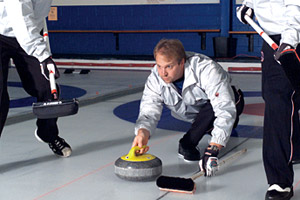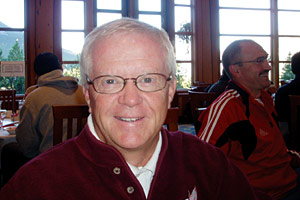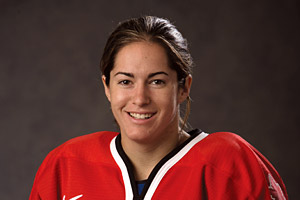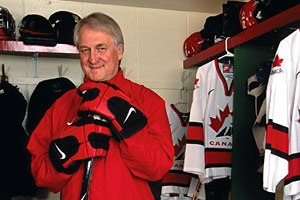
Inquiring Minds
There's scientific method in those lab coats
by Wendy Harris
Teaching Success
Teachers hope to lead Canada's Olympic class of 2006
by Teddy Katz
Nurturing the Naturals: Teacher-Parents at the Olympics
by Teddy Katz
A New Vision for the Profession
Changes proposed to teachers' ethical and professional standards
by Gabrielle Barkany
Transition to Teaching 2005
Underemployment in a mixed Ontario job market
by Frank McIntyre
Teaching SuccessA teacher is hoping to lead Canada's Olympic class of 2006 this February in Turin.by Teddy Katz |
 |
Marcel Rocque is one of Canada's best hopes to bring home a gold medal from these winter games. Since 1999, he has been a big part of one of the world's most dominant men's curling teams – Randy Ferbey's foursome from Alberta. They've won four Canadian championships and three world championships and now their eyes are set on Olympic gold, something that has eluded Canada's men's teams since curling became an official Olympic sport in 1998.
"I don't think there's anything bigger in sport than to bring home a gold medal for our country," says Rocque. He notes that expectations for Canada's men's curling team are high. "We'd love to be the first ones to do it."
As good as he is on the ice in curling, he's just as comfortable at the front of the gymnasium at Riverbend Junior High School in Edmonton. The Grades 7 to 9 students at the school know him better as Mr. Rocque (a perfect name for a curling star). He's been teaching physical education there since September of 1996.
"I went into education because I've always related well with kids, and obviously phys ed was a natural for someone who loves sports."
From the outset, Rocque knew he would have to be a different kind of educator to successfully combine teaching and curling. While most teachers concern themselves with how many days kids are missing school, he was worried the shoe might be on the other foot in his case.
First job
"When I got my first job offer, I told them before I would accept a position. I had to let them know that I was a competitive curler and needed time off to compete."
Rocque says the principal at the time was a former phys ed teacher himself, who saw real benefits in having one of Canada's elite athletes on his staff.
"The phys-ed curriculum here is intended to promote physical fitness and activity. So what do I bring? I bring role modelling for the kids," he says. "There's setting goals, chasing your dreams and being well organized enough to juggle it all."
Rocque explained that he would need at least two weeks before Christmas for the big competitions and if his team did well he would need even more time away.
He recalls that his principal said, "Well, as long as you're willing to give up 1/200th of your salary every day you're off. It's going to be expensive for you but we'll support that."
Rocque was thankful for the support. Every time he went away, the whole school got behind him and followed his competitions. When he came back he spoke at school assemblies about his experiences.
Conflicting needs
The success Rocque's team was having on the ice, however, gradually started to take its toll at school. He had to take more days off every year. In 2001, the first year Rocque and his teammates made it to the world championship, he missed 30 days – and more recently he missed 44 days. Then there were changes at Rocque's school and the board.
"Next thing you know, after seven years of support, I'm having difficulties," he says. "Obviously the new leadership felt the benefit of role modelling for students wasn't as great a factor as a lack of continuity in the classroom. I guess it became a philosophical point of debate."
The debate isn't new. It has been going on at least since the 1960s in Ontario. That's when competitive curler Jim Waite was teaching at Oak Park Elementary School in London. When he asked for time off to play in a championship, the school board told him it wasn't possible.
 |
Jim Waite was a championship curler and a teacher at Oak Park Elementary in London in the 60s. |
"When I was first doing it, it was not allowed at all," Waite says. "I had to kind of fudge things so I could get away without claiming sick days all the time. That happened more than once, just so I could get out."
Eventually his principal, Sam Munro, took up his cause. Munro went to the school board to ask for a change in policy so that teachers could have unpaid leave to attend important competitions. Munro even covered Waite's classes during his absence.
“London may have been one of the first boards to have a leave policy.”
"If it hadn't been for him, it would have been a tougher road for teachers who are involved in athletics," Waite says. "London may have been one of the first boards to have a leave policy in place whereby teachers could actually compete in provincial and Canadian championships – with a loss in pay."
Many, if not all, Ontario school boards now have clauses in their collective bargaining agreements designed to allow teacher-athletes to apply for special leave – with a deduction in their pay.
Aspiring teachers in hockey
That's good news for an aspiring Olympian planning to use her skills in front of the classroom someday soon.
Katie Weatherston is hoping to be part of Canada's women's hockey team – looking to defend its gold medal title from the previous Olympics in Salt Lake City.
Weatherston, of Thunder Bay, is a psychology major who is a year away from receiving her teacher certification at Dartmouth College, an Ivy League school in New Hampshire.
 |
Katie Weatherston is hoping to defend Canada's gold medal title in Turin. |
"A lot of things go hand in hand with teaching," she says, comparing it to hockey. "I want to teach kids a work ethic, how to manage time, goal setting – a lot of things overlap between sports and education."
Weatherston has been thinking about teaching for years – since well before she thought she could gain a spot on the national team. She realizes it may be difficult to juggle the demands of two careers, but she wouldn't have it any other way.
“How to manage time, goal-setting – a lot of things overlap between sports and education.”
"I always wanted to teach and coach because those are two areas where I felt I was really gifted," she says. "And for me, I think I can manage both of them. It's good to have a little bit of an outlet. It helps to stay focused on hockey but it's also nice to have something else, just so you're not putting that much more pressure on yourself."
Next year, when she finishes school, Weatherston is hoping to land part-time work as a substitute teacher so she can keep up her hockey schedule. "That would be a great way to start off my career and still concentrate on hockey. For me that would be ideal."
Juggling act
Wally Kozak says it is almost impossible to do more than occasional teaching and be a successful Olympian these days. He's the Director of Player Development for Canada's women's hockey team. And he has spent much of his life in education.
Kozak graduated with a Bachelor of Education from the University of Saskatchewan in the 1960s, when he was also a member of Canada's national men's hockey team. He taught while he played on the national team in 1968. The legendary Father David Bauer ran the Olympic hockey program then. He wanted players who were well rounded – both good athletes and top students.
But with teams centralizing these days, which means living together the year leading up to the Olympics and training nearly full time, things are quite different. Kozak says athletes sometimes have to sacrifice their careers for a period that could last from eight to 10 years.
"In winter sports especially, the athletes are training to such a degree that you can't maintain your occupation," says Kozak. "You can't take a normal teaching job anymore. Perhaps you can do part-time or substitute teaching but the demands on the winter-sport athlete don't allow for more than that. They sacrifice their jobs and their professions . I think it's the reality of the level of sport today."
 |
Former teacher and men's national team player, Wally Kozak is now Director of Player Development for the women's hockey team. |
Karen Strong is the Life Services Manager at the Calgary Sport Centre where many Turin-bound athletes train. Part of her job is to help them think about life after sport. She says it is not just athletes training to become teachers who are having a difficult time.
"In general, for winter-sport athletes, the post-secondary calendar does not favour them. It usually goes from September through April and that's the high point of their season."
Strong says athletes have to learn how to plan ahead and be flexible. Sometimes it may take years to get their degrees. They have to come up with creative solutions when problems arise.
Leaves of absence
Marcel Rocque knows all about that. His curling team was finally dethroned as Canadian champion in 2004. The athletes decided to commit even more time to their training. But Rocque's busy curling schedule was already causing him grief at school. He took an unpaid leave of absence from the school last year, from mid-September until April, to concentrate on curling. And he is doing the same thing this year.
"The difficulty becomes: Where do you draw the line?" says Rocque. "I guess at this stage of the game it's an easy decision. At first, when the school board came to me with the fact that they weren't going to support me anymore, I was within inches of saying, "Okay, I'll quit curling because I have responsibilities to my family." The 34-year-old is married with two children, three and five years old.
He is now on unpaid leave and tries to make ends meet with the $1,500 he receives monthly from Sport Canada as one of Canada's top Olympians. If not for the prize money his team has been able to win, he says, he wouldn't be able to continue curling.
Teach or curl
"I don't know whether I'll have to choose after this year – to quit either curling or teaching. I'll cross that line when I get there. I do know there's no long-term future in this game for me. But there is the possibility of representing my country at the Olympics.
"Do I feel rewarded for making these decisions? Absolutely! But is there some resentment when you are forced to make them? Absolutely – there is!"
When young curlers considering a career in education ask his advice, Rocque is quite blunt: They might want to consider another profession.
Jim Waite, the curler who had difficulties of his own years ago, did continue to teach and eventually became a principal in the London area. Now Waite will be in Turin as the coach of Canada's Olympic curling team. He says that having a supportive principal is key. Some administrators are worried about setting a precedent. "Some don't see that the benefits outweigh the costs when a teacher like Rocque goes to the Olympics.
"If the principal and school board can see the light, it can be very positive. The athlete brings all these experiences back to the kids. When Marcel comes back he's asked to speak at his school and others about his experiences. It can be a motivator for Canada and Canadians to do well at world events."
But Rocque realizes that even if he wins an Olympic gold medal not everyone will see things that way.
"Obviously," he says, "there are those who are going to say they don't care whether or not Mr. Rocque is pursuing this for their country – they want their kids to be number one. And I understand that. It's a question of whether or not the benefits outweigh many of the negatives. But in my opinion, as a phys ed teacher, it's an easy choice."
Win win win
Rocque thinks there should be ways to make it to the Olympic podium without abandoning your teaching career. He hopes that administrators can learn some lessons from his and other competitive athletes' stories. If they can find creative ways to use Olympian teachers as role models and to build more flexibility into teaching schedules for training, competition and other pursuits that enrich teachers' experience and students' learning – it could be a winning combination for students, teachers and Canada.
Teddy Katz is a national news reporter for CBC radio. Turin will be the 7th Olympic games covered by Katz for the CBC.





